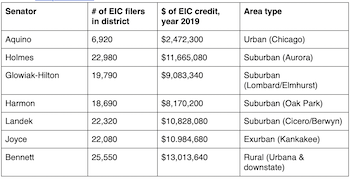Capitol Fax.com - Your Illinois News Radar
Latest Post |
Last 10 Posts |
Archives
Previous Post: Irvin thwacks Bailey in another mailer for being a “liberal” who broke with Trump, Bailey releases video denouncing Irvin
Next Post: Oppo dumps!
Earned Income Credit by House and Senate districts
Posted in:
* Jenna Severson at Economic Security for Illinois…
Hi Rich,
I’m providing you with the first look at the full data file the Coalition to Make EIC Work has used to present our case to expand Illinois’ Earned Income Credit. We created district-specific palm cards and found that members were quite interested in sharing them with each other to compare. We thought you might want to publish the whole list.
Here is a breakdown of how the Earned Income Credit currently benefits each district.
The data come from the Center for Budget and Policy Priorities (CBPP) based on IRS filings from the most recent full tax returns (2019). The figures for 2019 EIC amounts are compiled by the Institute for Taxation and Economic Policy (ITEP).
Since its inception in 2000, Illinois’ Earned Income Credit has funneled more than $3 billion dollars directly back into communities. The Earned Income Credit benefits Illinoisans in every zip code and every district in the state. In 2019 alone, the Earned Income Credit brought nearly half a billion dollars ($418,602,960) to 946,220 tax filers in the state.
It should be noted how dramatically EIC benefits suburban and rural communities.
Senator Omar Aquino is the lead sponsor of the EIC expansion legislation. While EIC provides a significant benefit to Senator Aquino’s constituents, many low wage workers in poverty are living in the suburbs, and for that reason a number of suburban Senate districts actually receive far more benefit from the EIC than Senator’s Aquino’s. For example: two of the Senate districts with the highest amounts of EIC benefits received are suburban (Holmes & Glowiak-Hilton). See the chart below or full spreadsheet.

If we expanded the Earned Income Credit to immigrants who file taxes with an ITIN number and childless adults aged 18-24 and over 65, nearly one million (955,471) Illinoisans would become newly eligible for the credit. The impact would be thousands of newly eligible households in each Senate and House district, and along with it, millions more invested across the state.
The spreadsheet has both Senate and House districts. Click here.
* Related…
* House Dems release $45.6 billion budget as negotiations continue: While the House Democrats’ plan includes direct payments to Illinoisans, it would apply to only those currently eligible for the federal Earned Income Tax Credit. Those qualifying for that credit would receive $100 from the state for single filers and $200 for joint filers, plus $50 per dependent. It’s a major cutback from a plan proposed by Senate Democrats which would have sent checks to about 97 percent of taxpayers, making up most of the $500 million difference between the House and Senate tax relief plans. The cost for that would be $165 million, according to estimates from the House Democrats, while another expansion to the Earned Income Tax Credit, or EITC, would cost $103.5 million. That measure would increase the state Earned Income Tax Credit by two percentage points, raising it to 20 percent of the federal tax credit. The EITC is a credit available to low- and moderate-income households. It is a refundable credit, meaning those who qualify can receive a refund, even if the amount of the credit exceeds what they would otherwise owe in taxes. It would also expand the state EITC to include people aged 18-24 and those 65 years and older.
posted by Rich Miller
Thursday, Apr 7, 22 @ 1:03 pm
Comments
Add a comment
Sorry, comments are closed at this time.
Previous Post: Irvin thwacks Bailey in another mailer for being a “liberal” who broke with Trump, Bailey releases video denouncing Irvin
Next Post: Oppo dumps!
Last 10 posts:
more Posts (Archives)
WordPress Mobile Edition available at alexking.org.
powered by WordPress.

= it would apply to only those currently eligible for the federal Earned Income Tax Credit =
This is the better plan.
I don’t need the state to send me any money.
The property tax rebate should also go up to 500k from 250k for individuals as the max income to be eligible. I don’t need a property tax rebate either.
“The House plan also adds $100 million to the Local Government Distributive Fund”
Oh well, nothing is perfect. The costs of compromise.
Comment by TheInvisibleMan Thursday, Apr 7, 22 @ 1:23 pm
“The cost for that would be $165 million, according to estimates from the House Democrats, while another expansion to the Earned Income Tax Credit, or EITC, would cost $103.5 million}
Where are the data or studies to support this? This smacks of spending influenced 100% by impending elections and a less than rosy political forecast for the Dems.
context:
The EIC for the tax year 2021, a family of four (in which couples are married and filing jointly) must have earned less than $53,865 a year to qualify for a potential tax credit of $5,980
https://www.irs.gov/credits-deductions/individuals/earned-income-tax-credit/earned-income-and-earned-income-tax-credit-eitc-tables
Comment by Donnie Elgin Thursday, Apr 7, 22 @ 1:26 pm
==I don’t need a property tax rebate either==
Then don’t attach a Schedule ICR to your IL-1040. The state won’t mind.
Comment by City Zen Thursday, Apr 7, 22 @ 3:12 pm
Let me be more clear.
Nobody making 249k needs a property tax rebate from the state either.
Comment by TheInvisibleMan Thursday, Apr 7, 22 @ 3:57 pm
yikes. And reading my initial comment I see the problem. I made a mistake.
rebate should phase out at 100k income, not 500k(or 250k).
Comment by TheInvisibleMan Thursday, Apr 7, 22 @ 4:03 pm